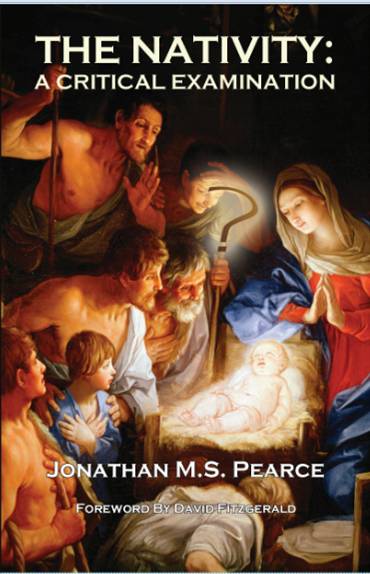Holidays are coming, holidays are coming…
It’s that time of year, you know, the interminable run-up to Christmas when big corporations vie for your hard-earned cash in an attempt to exploit the seasonal goodwill brought on by the imaginary birth of a godmanspirit.
Well, have I told you recently that I wrote a book on that very topic?
I didn’t?
How very careless.
Anyway, I wrote a book on that topic. It’s called, fittingly, The Nativity: A Critical Examination. Anyway, you should part with your hard-earned cash to acquire it, because that would allow me to feed my children over the festive period (think Tiny Tim from Scrooge).
Hilarity aside… I had a debate a few years back concerning matters brought up in the book on the Reasonable Doubts radio programme and podcast with Randal Rauser. Check it out here. The book forms the foundation of some of what I say in that debate.
Essentially, I set out to write a concise analysis of all of the issues with the nativity accounts, doing so in a robust, yet economical way. I think it’s a great book, obviously, since it sets out to do in one book what you see in bits and pieces of other books and chapters and places online. Here is what one kindly reviewer wrote:
I’ve never written a book review before. Occasionally I’ve considered reviewing books and essays I found to be not only interesting, but enjoyable and enlightening.
So I’ve decided that once in a while, when I’ve read something I consider really well done, I would write about it here that I might convince a few of you to spend your money and time trusting that you would have a similar experience as I have.
I believe that Jonathan M.S. Pearce’s work, THE NATIVITY: A Critical Examination is one of those books you’ll find as I described above: both enjoyable and enlightening.
I don’t know much about Mr. Pearce other than from his blog and I didn’t just stumble on this work accidentally, but it was recommended to me by a friend. What I discovered in the opening pages was someone that was performing some serious scholarly work, but not in a pedantic fashion. Honestly, I found the book hard to put down, but on the other hand, I also didn’t want to complete the book too quickly.
What first comes to mind for me about this book is that it made me think. Most of us are aware of the story of the Nativity as described in the New Testament books of Matthew and Luke, and the inconsistencies between the two accounts. How many of us have taken the time to look at each account together, verse by verse, and deconstruct those stories? This is what Mr. Pearce does very well in this book. This is a scholarly work as I mentioned earlier but is written for the layman. He consistently quotes scholars in ancient history and biblical studies – on both sides mind you – to present what I consider a fair rendering of these two accounts of the birth of Jesus.
Without giving too much away, (because I would like you to read and judge for yourself) consider just these few areas that are discussed and analyzed:
Why it is that Christians will believe in the virgin birth of their god, and yet dismiss as mythology other virgin births in more ancient religions?
The genealogy of Jesus; why there are two different genealogies and what is each author trying to portray to the readers of Matthew and Luke.
What I refer to as the conundrum of the “census” that causes Joseph and Mary to travel to Bethlehem.
How the authors used Old Testament “prophecy” to justify the eminence of Jesus over all other gods.
These are just a few of the areas covered and what I found really enjoyable is how Mr. Pearce, throughout the book, weaves these stories to show the reader the incredulity of the entire event.
I truly believe that like me, you’ll have a better understanding of what has been heralded by Christianity for 2000 years as a “miraculous” event, as nothing more than two writers, trying to justify the supremacy of their god for their own readership. I actually came away from this book actually wondering why anyone, anyone, even 2000 years ago, could have taken either story as being a true account. It also left me with a larger question as well: How is it possible that early church fathers selected these works, having to know that there were significant differences in the accounts, as part of the Christian canon?
I highly recommend this book. You can buy it in paper or Kindle format here.

